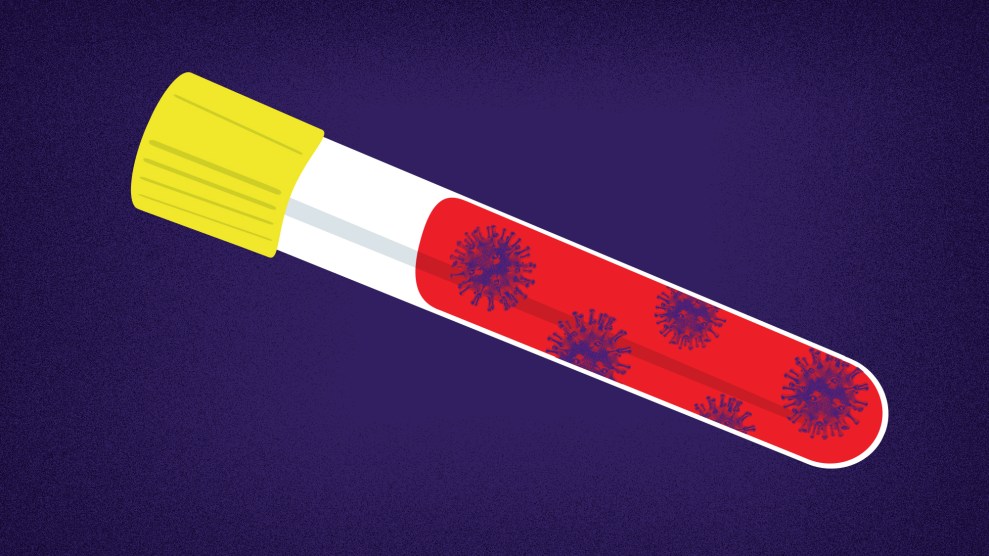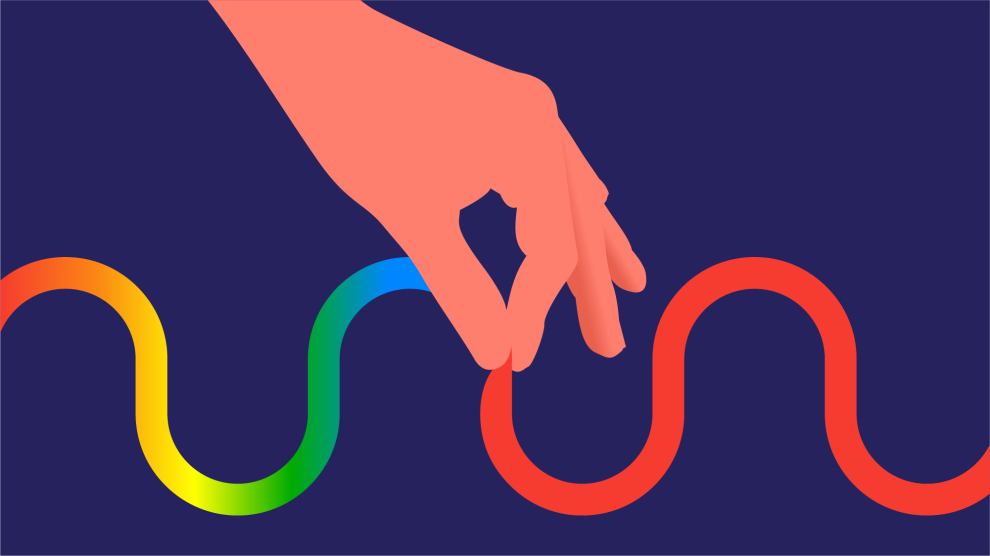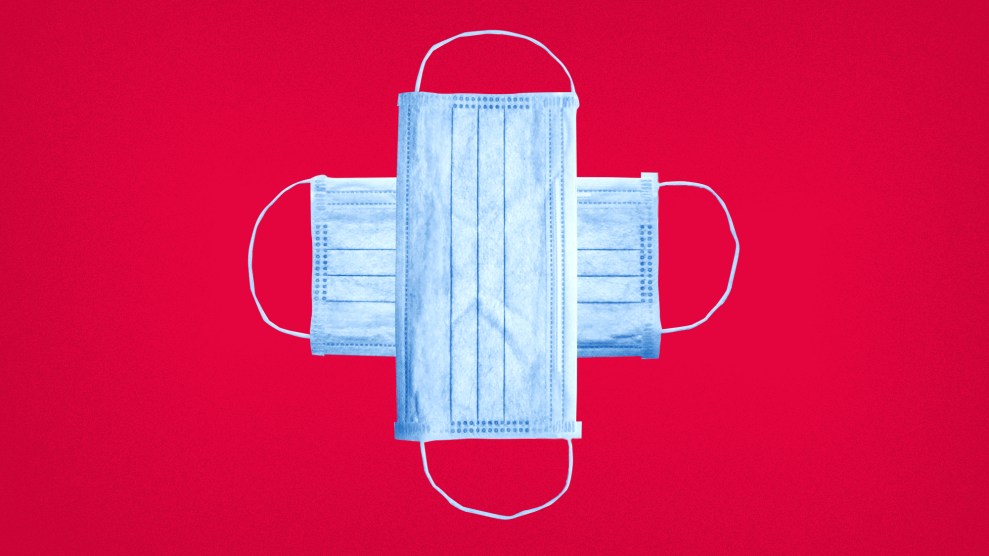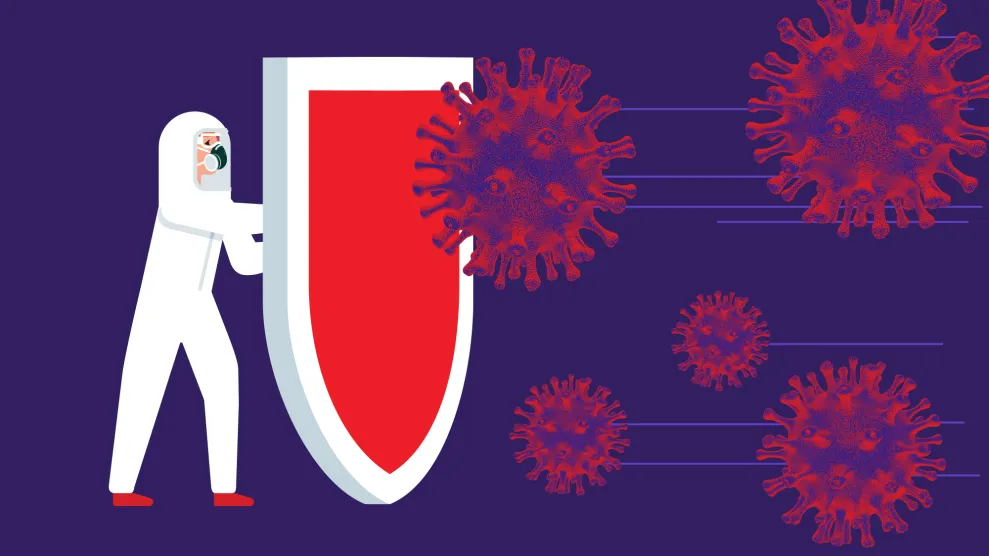
Mother Jones illustration; Getty
On January 20, just a day before the coronavirus officially showed up in the United States and more than a month before the World Health Organization declared the outbreak a pandemic, doctors in China launched a small, five-person clinical trial to test whether plasma from recovered COVID-19 patients could help treat others in critical condition. Within days of receiving this plasma, four of the five patients began to recover—and as of late last week, three of the patients had been discharged, and two were in stable condition.
The results are preliminary, of course, but early studies like this, plus the long history of successful plasma treatments, offer a promising option to help some patients with severe cases among the 1 million globally who’ve contracted the coronavirus. “Convalescent plasma,” as plasma from survivors is called, is now being deployed in clinical trials in the US: Last week, New York Gov. Andrew Cuomo announced that the state, which has been overwhelmed with COVID-19 cases, would become the first to conduct research with the treatment, and the state is currently collecting blood donations from people who’ve recovered.
As treatments go, convalescent plasma is low-hanging fruit—it is widely accessible and relatively safe—but it’s actually just one of several antibody-based COVID-19 therapies currently in development. Some researchers, for example, are producing coronavirus antibodies in a lab; others are testing antibody treatments already on the market for other conditions, with potential crossover benefits for COVID-19 patients; and some scientists are even sourcing coronavirus-fighting antibodies from mice. Overall, there are dozens of antibody treatments (and several more that aren’t antibodies) in clinical and preclinical stages of development.
But remember: Nothing is a sure thing here.
There are a lot of possibilities to unpack. To start: How do these various antibody treatments actually work? How are they different from a vaccine? Will receiving plasma from a survivor make you immune to the virus? And what about testing for antibodies in the first place? What does that look like, especially since we know that many infected people don’t show symptoms?
Over the past week or so, I joined my colleague James West, himself a COVID-19 survivor looking to help, to dig into these questions and so much more. We spoke with several experts: Vincent Racaniello, a professor of microbiology and immunology at the College of Physicians and Surgeons at Columbia University and co-host of the podcast This Week in Virology; Jesse Goodman, a professor in the School of Medicine at Georgetown University and director of the university’s Center on Medical Product Access, Safety, and Stewardship (COMPASS); Shane Crotty, a professor in the Center for Infectious Disease and Vaccine Research at La Jolla Institute for Immunology (LJI); and Nahid Bhadelia, an infectious diseases physician and the medical director of the Special Pathogens Unit at Boston University School of Medicine.
Below I’ve distilled our conversations into some key points:
Antibody treatments are different from vaccines. A COVID-19 vaccine would give you immunity to the disease, but antibody treatments won’t.
There is a simple difference between vaccines and antibody treatments: Vaccines basically teach your immune system to fight a virus, while antibody treatments help your immune system fight a virus. It’s sort of like, if you wanted to eat a pie, you have two options—learn to bake the pie or buy one that’s already made. Buying a pie from the store may satisfy your craving immediately. But if you learn to bake, you can make as many pies as you want in the future.
It’s the same with your immune system. If you’re vaccinated against a virus, your body will be trained to fight the virus over and over. Receiving antibodies from someone who has recovered from COVID-19, on the other hand, won’t make you immune to the virus. That’s the job of your own immune system.
The clear consensus is that surviving COVID-19 confers some immunity. And doctors can test to see if you’ve had the coronavirus in the past, even if you weren’t diagnosed at the time.
Though it hasn’t been proven yet, based on what we know generally about the immune system’s response to viruses, it’s assumed among experts that after you get the novel coronavirus once, you’ll have some immunity to it in the short term. As Dr. Anthony Fauci, an infectious disease expert leading President Trump’s coronavirus task force, told the Daily Show’s Trevor Noah last week, “It’s never 100 percent, but I’d be willing to bet anything that people who recover are really protected against reinfection.” It’s unclear how long that immunity lasts.
With a blood sample, doctors can conduct a test to see whether someone had the coronavirus—even if they were asymptomatic—and is now likely immune. These tests, called “serological tests,” are different from the diagnostic ones taken by more than 1 million Americans.
Widespread testing for immunity could prove crucial as we try to get this crisis under control: People who are immune could, in theory, go back into the workforce, care for the sick, and donate plasma for treating patients. “Doctors and nurses are being exposed to this all the time,” Crotty says. “And if you knew you had a group of people who were immune, you might stratify some of the jobs differently in terms of who takes care of the most severe cases or whatnot.”
Luckily, experts say serological tests are accurate long after someone has recovered
Serological tests, which work by detecting antibodies in the blood, can be accurate for a very long time after infection. Your body likely starts making antibodies against the coronavirus between seven and 21 days after you’re infected, Racaniello says. Those initial antibodies typically stick around in your system for about three months, while other antibodies take a little longer to develop and will likely be found in your blood years after you’ve had COVID-19. “Their levels go down gradually,” Racaniello says. “But there will always be a low level in the blood that you can detect for years and years after infection.” Serological tests can detect both types of antibodies.
These tests, which are already starting to be rolled out in New York, could be critical in revealing how many total Americans were really infected with the virus.
The tests often work by first removing the cells from the blood with the help of a centrifuge and then exposing the remaining liquid to a little piece of the virus. If you had COVID-19 at any point, antibodies in the liquid will attach to the virus fragment, just as they would in your body.
Listen to the Mother Jones Podcast to hear our own James West explain what it was like to live through COVID-19 and detail his attempts to donate plasma as a survivor—which, it turns out, he as a gay man was barred from doing. James also wrote about the experience here.
Not all antibodies are created equal
Some people are capable of producing powerful immune responses. Others, not so much. It’s not exactly clear why, and it could be due to any number of factors, including genetics, diet, and prior infections. “For sure, people differ in their immune responses, right? Some people have great immune systems, and they rarely get infections,” says Racaniello. “And other people get infections all the time.” This variation in immune response includes, but is not limited to, antibodies. “There are lots of places where your immune system can be defective,” he adds.
On one end of the spectrum, some people can’t produce antibodies at all, Racaniello explains. Some people will make antibodies but they won’t be very diverse. Or they’ll be ineffective. That’s why doctors test plasma from recovered patients before giving it to others. In some people “it won’t be very good,” Racaniello says. In “other people, it’ll be better.”
There are several types of antibody treatments in development—all of which have different upsides
Researchers across the world are trying to determine if antibodies can help cure COVID-19 patients. These are three common methods that could potentially use antibodies to help block the coronavirus:
- Convalescent plasma: This is what you’ve probably already heard a lot about, as patients in New York are starting to be treated using this method on an emergency case-by-case basis. It relies on plasma sourced from patients—or pooled from many patients—who’ve recovered from COVID-19. The plasma is injected into sick patients intravenously, providing the antibodies that another person created. This approach is generally safe and more than 100 years old. While it “is not proven for COVID-19 or any disease related to COVID-19,” Crotty says, “the overall concept of antibodies being protective is proven to be true for many infectious diseases, but not all of them.” The other potential catch is that for this treatment to be applied at a large scale, it would require tons of recovered patients to donate their plasma.
- Synthetic antibodies: This is another option that relies on patients who have recovered from COVID-19, Racaniello explains. It requires taking the cells out of their blood that make these coronavirus-fighting antibodies, called B cells. In a lab, scientists can use the B cells to make tons of antibodies, purify them, and then administer the product to patients. “That’s what we did for Ebola,” Bhadelia says. “We looked at the serum of survivors and we found those antibodies that were particularly effective. And then we created drugs that were basically biological drugs that were clonal copies of those antibodies.” Companies in South Korea, Israel, Canada, and the United States, among others, are working on making antibodies sourced from COVID-19 survivors. Researchers are also testing lab-created antibodies that are already on the market for other conditions, like cancers, arthritis, and HIV. They’re hoping these antibodies may also be effective in COVID-19 patients, to help their immune system in fighting the coronavirus or suppressing their immune system’s over-response to it, which can be deadly. There are several of these drugs already in clinical trials across the world, including in the United States, China, and Italy. Until a vaccine is available for the new coronavirus, these lab-grown antibodies, which can be produced rapidly, might make a better widescale option than collecting blood plasma, Goodman says.
- Coronavirus antibodies from animals: This would entail basically the same process as creating human antibodies in a lab—expose an animal, like a mouse, to parts of the coronavirus, collect the animal’s B cells, and create virus-blocking antibodies. The only problem is, humans’ immune systems may reject the antibodies from another animal, Racaniello says. “What people do instead is to try and make the mouse antibody as human as possible. It’s called ‘humanizing’ the antibody. And that will overcome these problems,” he explains. The benefit of this treatment is that it doesn’t require the complex process of screening for human coronavirus-specific antibodies, experts say. In fact, some synthetic antibodies already on the market that are being tested against COVID-19 were sourced from mice or other animals. New York biotech company Regeneron aims to start clinical trials with antibodies from mice in June.
It’s possible that certain antibodies can be administered to prevent, not just treat, COVID-19.
It’s a somewhat complicated distinction: While antibody treatment for sick patients will not directly give them immunity to the coronavirus, it’s possible that administering antibody treatments to people before they get sick could prevent illness temporarily. “When you inject the antibodies into your blood, they end up diffusing into all of your tissues, including your lungs. And so they would prevent infection,” Racaniello says. “That’s how a vaccine would work—except the vaccine would have you make your own antibodies.”
This isn’t the same as being immune, because, as I explain above, your body isn’t making its own response to the coronavirus; you’re still using someone else’s. That’s why, to prevent an infection with antibodies, you’d need an injection every month or two, Racaniello says. While this wouldn’t be considered effective long-term preventive care, this sort of treatment could be especially helpful for health care professionals on the front lines.
We’re already using antibodies as a prophylactic for some diseases that don’t have a vaccine, Goodman says. Take RSV, a common respiratory virus, especially in babies. “There is no vaccine against [RSV] yet,” he says, “but there is an approved [lab-grown] antibody that, in very high-risk children—for example, children with certain congenital lung and heart disease—can reduce their incidence of what are severe infections that occur in them.”
Additional reporting by James West
















